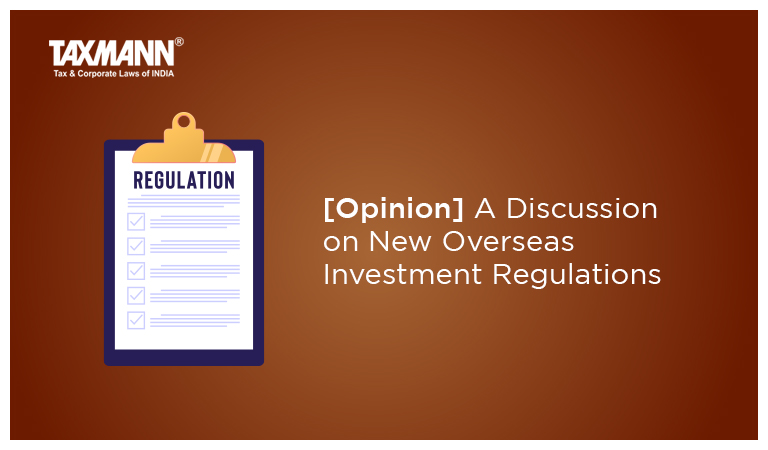[Opinion] A Discussion on New Overseas Investment Regulations
- Blog|News|FEMA & Banking|
- 2 Min Read
- By Taxmann
- |
- Last Updated on 6 September, 2022

[2022] 142 taxmann.com 63 (Article)
Under the pre-amended/old regulations, overseas investment, in respect of investment in foreign securities, is governed by Foreign Exchange Management (Transfer or Issue of Any Foreign Security) Regulations, 2004 and, overseas investment, in respect of investment in immovable property, is governed the Foreign Exchange management (Acquisition and Transfer of Immovable Property Outside India) Regulations, 2015.
Government of India, in order to improve its standards in ease of doing business by way of relaxations, simplifications or exemptions, is making many changes to various laws and regulations which inter alia includes changes to taxation laws, Foreign Exchange Management Regulations, Corporate and other laws etc.
Under the old regulations, overseas investment is considered to be investment in joint venture or investment in wholly owned subsidiary which has created some sort of confusion in relation to overseas investment by various persons in other overseas entities. Further, overseas investment by individual, investment by way of loan/ debt securities, round tripping concept were also topics of discussion under old regulations.
Now, in order to make overseas investment regulations simpler, and to provide certain clarifications/relaxations, Government of India has made changes to overseas investment regulations and rules thereunder. In this regard, Reserve Bank of India (‘RBI’) has notified Foreign Exchange Management (Overseas Investment) Regulations, 2022 (‘OI Regulations’) and Central Government has notified Foreign Exchange Management (Overseas Investment) Rules, 2022 (‘OI Rules’) with effective from 22.08.2022 which are applicable to OI in securities as well as immovable properties.
In this Article, we shall discuss various changes made by overseas investment Regulation/Rules In order to understand the new Regulations, following aspects has to be understood.
-
- OI Regulations and OI Rules shall not be applicable to following investments:
- Any investment made outside India by financial institution in an IFSC.
- Acquisition or transfer of any investment outside India made,-
i. Out of RFC Account
ii. Out of foreign currency resources held outside India by a person who is employed in India for a specific duration irrespective of length or for a specific hob or assignment, duration of which does not exceed 3 years.
iii. In accordance with section 6(4) of FEMA,1999 i.e., acquisition of foreign security or immovable property outside India if such security or property is acquired when such person was a resident outside India or inherited from a person who is resident outside India.
-
- OI by person resident in India has been divided into six parts in brief :
| Part | Details |
| Part I | Schedule I to OI Rules deals with ODI by an Indian entity |
| Part II | Schedule II to OI Rules deals with OPI by an Indian entity |
| Part III | Schedule III to OI Rules deals with OI by resident individual |
| Part IV | Schedule IV to OI Rules deals with OI by a person other than Indian entity or resident individual |
| Part V | Schedule V to OI Rules deals with OI in IFSC by a person resident in India |
| Part VI | Rule 21 of OI Rules deals with investment in immovable property outside India |
Click Here To Read The Full Article
Disclaimer: The content/information published on the website is only for general information of the user and shall not be construed as legal advice. While the Taxmann has exercised reasonable efforts to ensure the veracity of information/content published, Taxmann shall be under no liability in any manner whatsoever for incorrect information, if any.

Taxmann Publications has a dedicated in-house Research & Editorial Team. This team consists of a team of Chartered Accountants, Company Secretaries, and Lawyers. This team works under the guidance and supervision of editor-in-chief Mr Rakesh Bhargava.
The Research and Editorial Team is responsible for developing reliable and accurate content for the readers. The team follows the six-sigma approach to achieve the benchmark of zero error in its publications and research platforms. The team ensures that the following publication guidelines are thoroughly followed while developing the content:
- The statutory material is obtained only from the authorized and reliable sources
- All the latest developments in the judicial and legislative fields are covered
- Prepare the analytical write-ups on current, controversial, and important issues to help the readers to understand the concept and its implications
- Every content published by Taxmann is complete, accurate and lucid
- All evidence-based statements are supported with proper reference to Section, Circular No., Notification No. or citations
- The golden rules of grammar, style and consistency are thoroughly followed
- Font and size that’s easy to read and remain consistent across all imprint and digital publications are applied



 CA | CS | CMA
CA | CS | CMA
